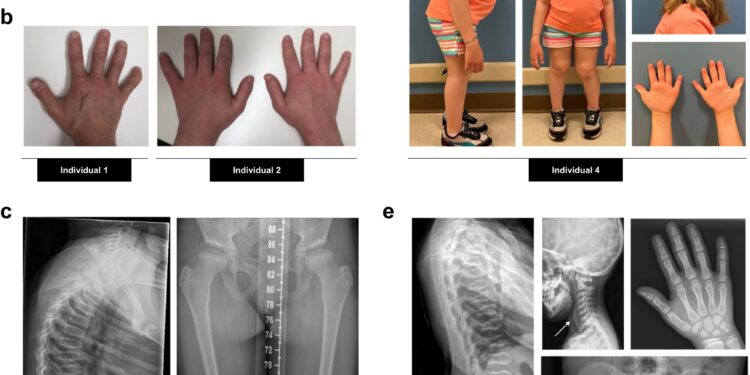Clinical description of affected individuals from families 1 and 2. a Pedigrees of the two affected families. The black symbols represent the people involved. b Photographs of the hands of two individuals from family 1 showing short hands (including short palms and brachydactyly) and brachytelephalangism. Left: Individual 1 (aged 52); Right: Individual 2 (at 18 years old). c Radiographs of individual 2 of family 1 at age 10 years showing diffuse platyspondyly with biconcave vertebral bodies throughout the spine, flattened and wide bilateral femoral epiphysis with uneven ossification of the acetabular roof. d Photographs of individual 4 from family 2 at age 10, showing short stature with a disproportionately short trunk, rhizomelia, exaggerated lumbar lordosis, midline facial retrusion, short hands with brachydactyly, and a slight bilateral genu valgum. e Radiographs of individual 4 of family 2 at age 7 showing diffuse platyspondyly with biconcave vertebral bodies throughout the spine, large flattened bilateral proximal femoral epiphyses, coxa vara, and brachytelephalangism of the little fingers . X-ray of the lateral cervical spine shows premature calcification of the cricoid cartilage (white arrow). Credit: Natural communications (2023). DOI: 10.1038/s41467-023-41651-6
A McGill-led team of researchers has made an important discovery that sheds light on the genetic underpinnings of a rare skeletal disease. The study, published in Natural communicationsreveals that a defect in a specific gene (heterozygous variants of matrix Gla protein, or MGP) can cause a disorder that affects the structure of the connective tissues that support the body.
MGP is a special protein found in blood vessels and cartilage that helps prevent hardening of these tissues in the body. If MGP is completely absent, it can lead to Keutel syndrome, a rare disease in which tissues calcify, causing problems with the skeleton and blood vessels.
However, in this case, the MPG gene variance observed by the researchers is different from Keutel syndrome, both in how it manifests in humans and in what happens at the cellular and molecular level.
“Our paper reports four people from two different families who showed a slight change in their MGP gene. These changes made the protein a little different and these individuals showed a specific bone disorder,” explains Monzur Murshed, full professor in the Department of medicine. , Divisions of Endocrinology and Metabolism and Experimental Medicine and Faculty of Dentistry and Oral Health Sciences, and senior author of the study.
After testing these genetic changes in mice to better understand the situation at the cellular and molecular levels, the researchers found that the MGP modification caused similar bone problems in mice and humans. Unlike normal protein, the modified protein does not exit cells, causing stress in a part of the cell called the endoplasmic reticulum. The cartilage cells producing the modified protein cannot cope with the stress and eventually die, causing bone abnormalities.
One step closer to understanding rare diseases
This research not only expands the understanding of genetic factors contributing to skeletal dysplasia, but also paves the way for potential therapeutic interventions. The results highlight the importance of the MGP gene and its role in skeletal development, raising hope for improved diagnosis and treatment of people affected by this rare disease.
“There are many rare diseases with similar skeletal problems. We hope that if more people know about our work, they can come forward to consult with clinicians and researchers,” adds Professor Murshed. “After our paper was published last month, we were contacted by a clinician who examined another individual with skeletal dysplasia carrying the same MGP gene mutation. This could help further research and also improve treatment and management of these diseases. in the long term.”
More information:
Ophélie Gourgas et al, Specific heterozygous variants of MGP lead to endoplasmic reticulum stress and cause spondyloepiphyseal dysplasia, Natural communications (2023). DOI: 10.1038/s41467-023-41651-6
Provided by McGill University
Quote: Discovery unveils the mystery of a rare bone disease (January 16, 2024) retrieved January 16, 2024 from
This document is subject to copyright. Except for fair use for private study or research purposes, no part may be reproduced without written permission. The content is provided for information only.



